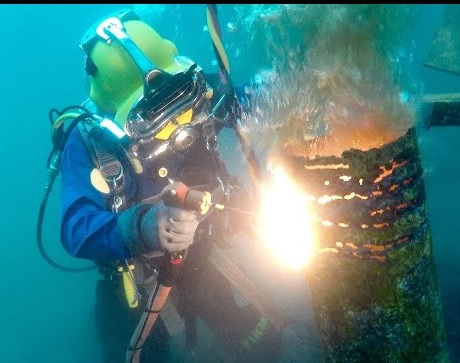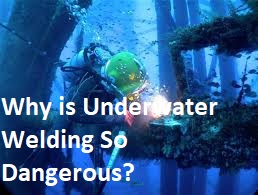Underwater welding is a risky job that comes with different hurdles and dangers in the working field. There can be hazardous conditions and a chance of electric shock and exposure to toxic gases. There are many challenges in underwater welders’ work that can cause injuries and also death.
If you have an injury at sea during work, get advice from a maritime law attorney; that is important. In this post we will cover details for different dangerous conditions for underwater welders and know how to handle these conditions.
Underwater Welding Dangers
- Underwater welding work is performed in unsafe working conditions. In high depths, high pressure can affect our body.
- There can be chances of decompression sickness, conditions that can affect health implications in case of improper handling.
- Underwater welders move in murky waters with low visibility and face obstacles and marine life and also face abrupt variations in underwater terrain.
- These factors cause dangerous issues for welders working underwater. For handling these issues, there is a need for skills and proper training.
- Details show that underwater water has a high fatality rate. High-danger jobs, for example, loggers and fishermen, have less than 0.2 percent fatality rates. So underwater welders are more than 70 percent
Common Underwater Welding Dangers
Electric Shock
- Underwater welding faces different dangers due to current and water mixture that is fatal if not handled in the proper way.
- In these working conditions, welders use tools that release current. These currents are needed for welding and have a chance of high electrical shock.
- This danger is higher underwater, where current or electricity disperses and damages the welder.
- For handling these dangers, underwater workers needed certain instruments for avoiding electric shock. Their welding tools and protective suits have such features that they do not make water conductive for electricity .
Explosions
- There are gas pockets made through the creation of oxygen and hydrogen that cause a chance of danger for welders. If it ignites, it causes high explosions. Follow these points for handling these risks.
- Check any component of the working area that can trap gases overhead. You can use a vent tube for sending gases to the surface.
- Start the welding from the high point towards the lowest point.
- Electrodes with more than 10000 degrees Fahrenheit in gaseous conditions cause explosions in case of sparks.
- Start work externally and around the area. Pull electrodes after some seconds and make a brush action.
Drowning
- Differential pressure causes drowning accidents and is almost undetectable. It occurs when two water bodies with different levels intersect.
- Pressure difference can be hundreds of pounds per square inch, trapping and drowning the diver.
- If diving gear doesn’t work, like leaks in masks, oxygen tanks also cause drowning.
- The main thing is that not getting panicked, divers make dangerous conditions worse by not following instructions.
- So be calm and breathe as slowly as possible. If the air supply is cut off, then move to the emergency SCUBA supply tank. Find that there is any error on the helmet, and if you are below the surface, move at a safe rate.
Decompression illness
- As underwater welders work very deeply in the sea, they have chances to face pressure variation. Decompression illness is the result of low ambient pressure around the human body. That causes decompression sickness and arterial gas embolism.
- Decompression sickness is made through bubbles in tissues and makes local damages. The other error is due to bubbles moving in arteries and damaging tissue by blocking blood flow.
Hypothermia
- Underwater workers or maritime workers are busy in their jobs at times of low-temperature conditions, so they have chances to face hypothermia. Divers working on the larger preparation of pipe need some breaks and make continuous connections with crews on the surface for safety of life.
Marine Life
- Light emitted during welding work attracts marine life like plankton and fish. Mostly marine life does not cause any danger or serious injury, but in some conditions it comes into welder work and causes delay. That increases project completion time and also risk for the welder’s life.
How to Become an Underwater Welder
- Becoming an underwater welder is not an easy job; it is difficult to move from surface welding to underwater welding. There is a need for basic techniques from scratch to become a welder in underwater conditions and work in different conditions.
- • The first demand for becoming an an underwater welder is training and welding experience. You must have knowledge of different welding machines and methods involved. Also know how to handle current and gas flow.
- You must know how to work according to the welding specifications document.
- Another is that you must have knowledge of diving. You must have proper training for underwater diving gear, like a diving suit and mask for air supply.
- Welding becomes difficult then you don’t wear gloves and a mask for proper breathing.
- Also get commercial diving since this certification helps to handle different conditions, like how to set up hyperbaric chambers and communicate with other divers.
- It also teaches how to avoid any issues with health. Since decompression sickness is fatal, that causes another risk that can become fatal.
- Getting certification as a commercial diver is needed before starting a career as an underwater welder.
Is underwater welding a good career path?
- It is difficult to answer this question. But payment for this profession is very high if you have the required skills, experience, and networking with danger-handling capacity. But it also has high fatality rates.
- Surface welding is a lucrative job. But underwater wedding jobs are stressful and need high physical health.
- For those who love adventure and know how to live, so they can get this career, and this file is a viable and lucrative job.
- If you are a surface welder and have experience handling welding in different conditions, this option is best to use.
FAQs
What is high risk for the lives of underwater welders?
- Electrocution is the main cause of death for underwater welders.
What reduces the life of underwater welders?
- Gas pocket explosions that are made from oxygen and hydrogen cause risk for underwater welders since they are lethal. Electric shock is also a main risk for welders, so waterproof tools are used for underwater welding jobs.
Read our post: What is Laser Tube Cutting? Features, Types, Uses
What are the odds of surviving underwater welding?
- It is shown that underwater welding death comes with high fatality rates of about 15 percent and thousand times more dangerous than the job of a police officer.
Can underwater welders make 500k?
- Yes, underwater welders can earn $300K to $500K based on experience and working conditions that pay high and also the company for which you are working. Since it is a risky job, companies pay high for this job.
What is the most dangerous thing about underwater welding?
- Underwater welding involves electricity and water that can be fatal if not handled properly. The welder uses instruments that release electrical current. That current is needed for welding but causes a risk of electrical shock.
Why don’t underwater welders get electrocuted?
Wet welding is based on gas bubbles releasing around an electric arc for protection and avoiding current flow in water. Insulating layers of bubbles protect the diver, and also welding areas, and make it difficult to weld in the proper way.
What is the world’s most dangerous job?
- Logging Workers.
- Derrick Operators in Oil, Gas & Mining.
- Roofers.
- Garbage Collectors.
- Aircraft Pilots & Flight Engineers.
- Ironworkers.
- Delivery Drivers.
- Farmers.

